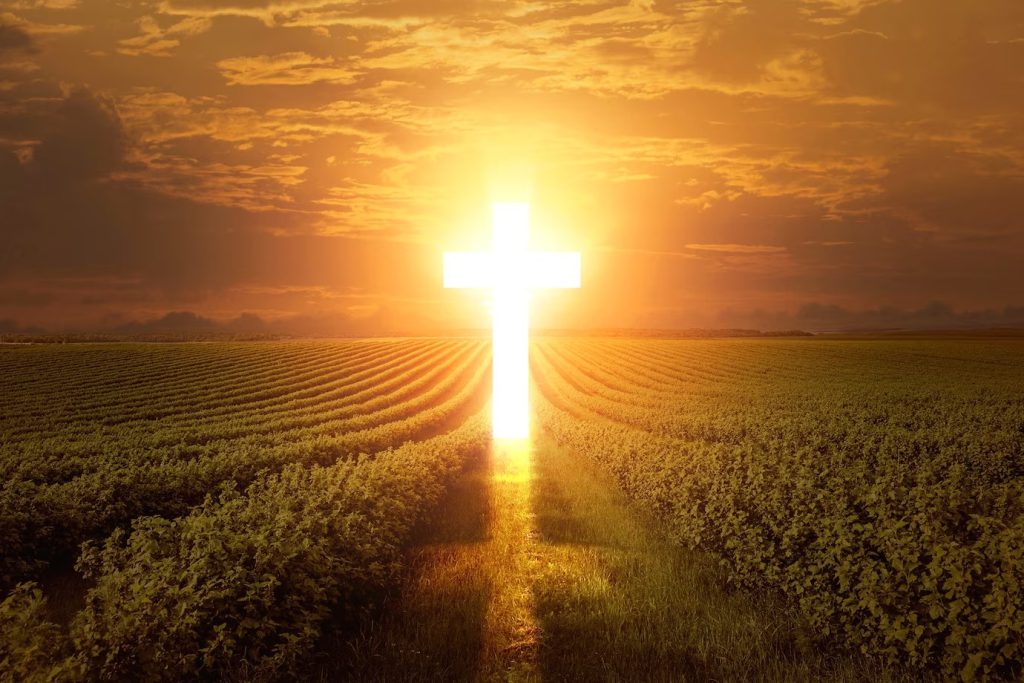What We Believe
- Salvation
This Picture-word applies to the expression of rescue of man from a state of misery and jeopardy to a state of safety. The Christian belief and foundation is that no one can save themselves only God can. Ephesians 2:8 ‘For by grace are ye saved through faith; and that not of yourselves: it is the gift of God.’ Salvation thus is not obtained but is given freely to anyone who believes on the Lord Jesus Christ. Salvation involves three aspects:
- Christ dying for us
- Christ living in us
- We living in Christ
united with him in his death and risen life (Romans 6:3-10) The action on our side is simple faith in Christ and the divine aspect is that the Spirit helps us sustain this union between God and man. A believer is saved from sin and death (Romans 6:23, Isaiah 59:2). What are we saved for?
To live in love towards God the Father, Son and the Holy Spirit – and to live in love towards our neighbors.


Repentance
A complete about turn towards a changed life. To repent means to change ones mind so that one’s views, values, goals and ways are changed and that one’s life is lived differently. It also means a complete handover of ones self into the hands of God through confessions of sins and denouncing past life. In the New Testament the call to repentance originates from John the Baptist to the glorified Jesus calling the seven churches of Asia to repent. (Matthew 3:2, Matthew 4:17, Mark 6:12, Acts 2:38, Acts 17:30, Acts 26:20, Revelation 2:5, 16, 22, Revelation 3:3, 19). Repentance is therefore the pathway to remission of sins and restoration to God’s favour. However there can be occasions when a believer has faith to be saved but still lives an un-repented life. This is a very dangerous lifestyle for a Christian. True repentance is ‘contrition’ as modelled by David in Psalm 51, having at its heart a serious purpose of sinning no more but of living henceforth to please God. Luke 3:8, Acts 26:20.
Resurrection
The resurrection of Jesus is the indispensable proof that the message about Jesus as Judge and Saviour is true (Acts 17:31, I Corinthians 15:1-11, 20). It is the concrete foundation of Christians to believe in eternity and life after death. The resurrection of Jesus was a divine act involving all three persons of the Godhead (John10:17, 18, Acts 13:30-35, Romans 1:4). In I Corinthians 15:50-54, II Corinthians 5:1-5 promises that Christians who are alive and those who have died before Jesus’ second coming will be given a new body, resurrected in the form and likeness of Jesus’ body. Jesus’ resurrection demonstrated his victory over death (Acts 2:24, I Corinthians 15:54-57) vindicated him as righteousness (John 16:10) and indicated his divine identity (Romans 1:4). It led to Jesus’ ascension and enthronement (Acts 1:9-11, Acts 2:34, Philippians 2:9-11, Isaiah 53:10-12) and his present heavenly reign. It guarantees the believers present forgiveness and justification (Romans 4:25, I Corinthians 15:17) and is the basis of resurrection life in Christ for the believers her and now (John11:25, 26, Romans 6, Ephesians 1:18 to 2:10, Colossians 2:9-15, Colossians 3: 1-4).


Baptism
An outward sign of inward cleansing. It is a ceremony that signifies inner cleansing and remission of sins (Acts 22:16, I Corinthians 6:11). Baptism is also a reminder to a believer that they have union with Christ in his death, burial and resurrection (Romans 6:3-7, Colossians 2:11, 12). This commands deputes any confession as to who can be baptised. Only a person who knowingly accepts Christ and willingly professes faith in him can be baptised. According to Christian faith baptism is total immersion in water – immersion baptism. Christ instructed his disciples to baptise in the name of the Father, the Son and the Holy Spirit (Matthew 28:19). This means that the covenant made by the believer is acceptance of, communion with and commitment to the Three Persons of the Godhead. Thus, baptism into the name of the triune God signifies control and direction by God himself. By this outward sign of cleansing the believer expresses the word that one has denounced the past and accepted the new life – God’s gift – in Christ which is freely given.
Baptism In The Holy Spirit
Acts 1:4, 5 Jesus instructed his disciples to wait for the promise of the Father. Acts 2:1-4 the Holy Spirit did descend upon the 120 gathered in the from of tongues of fire. The evidence – speaking with other tongues. The third person of the Godhead, the Holy Spirit brings boldness and authority into a believer. The Holy Spirit is our helper, guide who helps us live holy and righteous lives. The coming of the Holy Spirit upon the 120 gathered in the upper room on Pentecost ushered in a new era in the relationship between God and man. The Church – the ‘body of Christ’ – was established and God’s Spirit came to live in the minds and hearts of is people (I Corinthians 3:16). Being baptised in the Holy Spirit one can expect the miraculous gifts of the Holy Spirit (particularly speaking in tongues) as a manifestation of the infilling.


Born Again
In the Bible this term is used in the conversation between Jesus and Nicodemus. Jesus said, ‘No one can see the Kingdom of God unless he is born again’. This term signifies the need for all of mankind to have a spiritual rebirth. John 3:16 ‘For God so loved the world that He gave his only begotten son, that whosoever believeth in him shall not perish but have everlasting life.’ All Christians, by definition are born again. A truly born again person will example the opposite of their old life and live in the light and exercise themselves in Christ’s steps and ways.
Forgiveness
Pardon or an offence or a wrong; also called remission of sins. Man though being born again struggles with sin and temptation. I Thessalonians 1:9 God continues to forgive us as we continue to confess our sins. He removes far from us as far as the east is from the west. We are instructed to forgive one another, as we see in Ephesians 4:32.


Jesus
Jesus meaning Saviour is the second person in the Triune God who came to fulfil all messianic prophesy and would confirm it by his life on earth (Matthew 5:17,18). John the apostle expressed the birth of Jesus as something extraordinarily strange and special. John 1:14 ‘The Word became flesh and dwelt among us.’ Jesus was God and man therefore He not only could witness with man but also show us what God is like (John 14:8-10) He lived on the earth for 33years but was publicly known for 3 years. He got a lot of attention and derision from the religious leaders of his time, who were threatened by the acclaim he received from the masses. He trained 12 disciples who would carry on after he was gone. Eventually he was crucified after being falsely accused. Though many precautions were taken for Jesus not to fulfil his resurrection on the third day he arose from the grave and appeared to many people before his ascension into heaven.
Holy Spirit
The Third person of the God Head, the ‘Holy Spirit’ was promised to all who believed on Jesus (John 14:16, 17). The disciples did not have to wait long after Jesus’ death for the promise to be fulfilled. Acts 2: 1-4 The Holy Spirit came like a mighty wind in the form of tongues of fire upon the 120 gathered in the upper room. The Holy Spirit seems to be prevalent in the New Testament but it must be noted that he is instrumental in the time of creation. The Spirit of God is mentioned as the book of Genesis (Genesis 1:2; Isaiah 40:12, 13). Others in he Old Testament were equipped by the Holy spirit for specific tasks (Daniel 5:11, 12), Joshua (Numbers 27:18), Samson (Judges 15:14). But His movement and involvement was dramatically active among God’s people after the ministry and sacrifice of Jesus. The Holy Spirit is the Comforter John 14:26, the Spirit of Truth John 14:17.


GOD
In the Old Testament we see that God existed in eternity and became the creator of the universe (Genesis 1:1). But for us to comprehend this concept is very difficult for we know the cycles of time – day and night, summer and winter, birth and death. Yet it is God who created all these as illustrated in Genesis 1. Any other thing whether physical or spiritual that takes our attention is an idol. God who is pre-existent created everything, so if other Gods appear to compete with the original, they must be made by people – not Him. Exodus 20:1-4 expressly God and prohibits making of images to depict himself. While pagan temples were usually filled with various statues, portraits and other artistic expressions of what their god’s might look life, the first Jewish temple (tabernacle) contained only a box to symbolise the presence of God. This box called the Ark of the Covenant was made of wood and gold plated and the cover or the lid ‘mercy seat’ that portrayed two angels. Inside were a few prized souvenirs of Jewish history (Hebrews 9:4) the New Testament makes it clear that ‘God is Spirit’, so those so worship him must worship in Spirit and in truth (John 4:24).
To try and depict God as perceivable in any form is to limit our comprehension of Him. The totality of God cannot be grasped by human minds. The crux of Christianity is that this infinite, complex Spirit who is God has reached out to a sinful, finite species of human beings, wanting to bond with them and draw them to him. The Bible is a book written by the interpretation and unction of the Holy Spirit to be as a guide book to know God. The Old Testament prophets were sent to fulfil God’s desire to have a relationship with fallen man. But they failed to listen to the prophets so God in His compassion to draw mankind out of the path of destruction sent His only Son (John 3:16).
